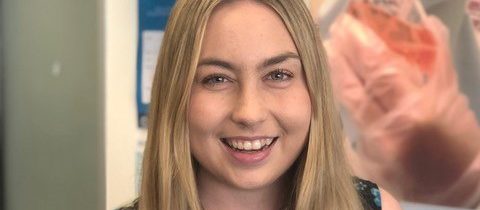Cancer activist and volunteer Kristen Larsen has been named a finalist in the Queensland Young Australian of the Year Awards.
The Upper Kedron local is one of four finalists and she will find out if she is the winner on Friday, November 9, at an awards presentation at the Brisbane Convention and Exhibition Centre.
Diagnosed with Stage 3C ovarian cancer at the of age 21 in 2013, Ms Larsen has selflessly volunteered in Australia and internationally to help build awareness of the illness and the need for more research and clinical trials.
Ms Larsen is the Brisbane Regional Coordinator of ANZGOG’s new program, Survivors Teaching Students, she chronicles her experience living with cancer on her blog “Ovarshare” and after recently winning a nationwide competition will be launching her own podcast series, with the same name, for which she will interview fellow survivors.
Ms Larsen said she was honoured to have received this recognition.
“When I was diagnosed with ovarian cancer, I was given only a 16 per cent chance of surviving the next five years,” she said.
“This was terrifying, and I immediately put up my hand to volunteer and help the cause in any way I could in the time I had left.
“It’s amazing to think that bit by bit, each conversation, speech, fundraiser and campaign has totalled over $1 million for cancer charities.
“I am so grateful to not only be alive to see this day, but to be able to celebrate the last five years of struggles and achievements.”
Ms Larsen has been in constant treatments for the last five years and recently found out that her cancer is progressing again.
“I am now on the wait-list for a clinical trial,” she said.
Highly active in the ovarian cancer community, Ms Larsen often travels to the USA and across Australia for survivorship conferences and symposiums.
“I’ve been to a few ovarian cancer survivor conferences run by charities in the US and like to be involved in advocacy work,” she said.
“I’ve connected with lots of people, but there’s not many women my age with ovarian cancer.”
Each year, about 280 Queensland women are diagnosed with ovarian cancer, but is most common in women over 50.
There is no early detection test for ovarian cancer, so the best way of detecting the disease is to know and recognise the signs and symptoms.
Through sharing her story Ms Larsen has raised greater awareness of these symptoms, so women of all ages know what to look for, and helped charities, like Cancer Council Queensland, raise vital funds for cancer research.
Cancer Council Queensland CEO Ms Chris McMillan said Kristen’s nomination was just another testament to the strength and resilience she had shown through her cancer experience.
“I want to recognise the fight and determination Kristen has shown – for someone her age, she has shown an incredible amount of strength and resilience,” Ms McMillan.
“Kristen’s unwavering dedication to raising awareness for ovarian cancer and vital funds for cancer research has seen her become involved in a number of our fundraising campaigns and events – she was the face of our Girls’ Night In campaign in 2016 and has donated her time for several speaking engagements.”
For more information on the Australian of the Year Awards visit australianoftheyear.org.au.
More information about Cancer Council Queensland and ovarian cancer is available at cancerqld.org.au/ or via 13 11 20.
ENDS
Symptoms of ovarian cancer
In its early stages, ovarian cancer usually have no symptoms. This means it is typically diagnosed when the cancer is more advanced. If symptoms occur, they may include:
- Pressure, pain or discomfort in the abdomen or pelvis.
- Swollen or bloated abdomen
- Appetite loss or feeling full quickly
- Changes in toilet habits (e.g. constipation, diarrhoea, passing urine more often, increased flatulence).
- Indigestion and nausea
- Tiredness
- Unexplained weight loss or weight gain.
- Changes in menstrual pattern or bleeding after menopause
- Pain during sex.
If these symptoms are new for you, are severe or continue for more that a few weeks, keep a record of how often they occur and make an appointment with your general practitioner (GP). These symptoms can also occur in many other conditions and do not necessarily mean you have cancer, but it is best to have a check-up.
For more information, please contact:
Lisa Maynard, Manager, Public Relations and Social Media
Cancer Council Queensland
P. (07) 3634 5171 or E. lisamaynard@cancerqld.org.au

